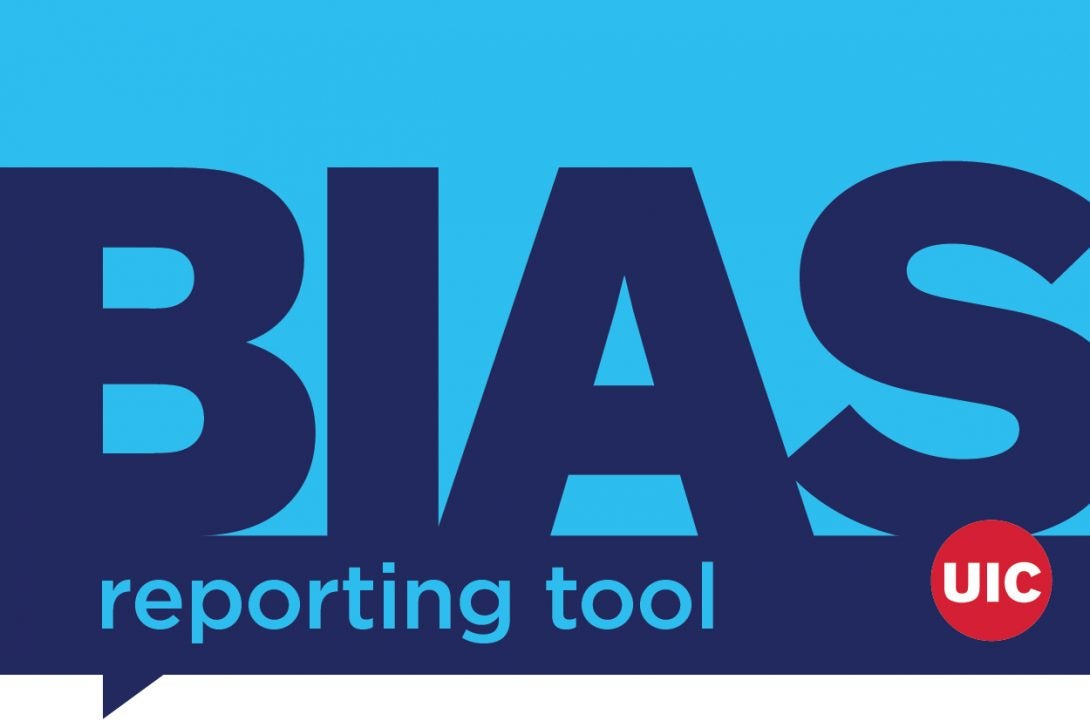Bias Reporting & Prevention
Purpose & Goals

At the University of Illinois Chicago, we believe our diversity is our strength and we are committed to building a campus where all students, faculty and staff can thrive. An important part of that commitment is addressing incidents of bias when they arise. Numerous studies have documented the harm that bias, when left unchecked, can have on individuals of a range of intersectional identities on a college campus (e.g., Boysen, 2012; Nadal, Wong, Griffin, Davidoff & Sriken, 2014; Pittman, 2012; Woodford, Joslin, Pitcher & Renn, 2017). As acknowledged in UIC’s Diversity Strategic Plan, we cannot take meaningful action towards building an inclusive climate without also addressing the biases and prejudices that may be present in our community. This includes providing a space for students, faculty and staff to report incidents of bias and have their concerns heard, and opportunities for education both for those who may have engaged in biased behavior and for the campus community at large. The Bias Support processes are an integral part of this effort.
The goals of the Bias Supporting Response process are as follows:
- Provide an easily accessible and usable system for the campus community to report bias incidents.
- Support members of the UIC community who have been impacted by bias incidents.
- Center the concerns and hopes of those who report bias incidents in the response process. Including, if at all possible, letting them play a role in how the bias incident is addressed.
- Collect data and review trends of bias incidents in order to better understand the complex needs and challenges facing the campus, and guide recommendations to university leadership who can then create appropriate policies, education and programs.
Important Definitions
When making reports through the Bias Support Tool, it is important to understand the definition that is used to describe Bias, Discrimination, and Harassment. We have provided the definitions below.
- Bias is defined as behavior that is an expression of hostility against a member of the University community because of their real or perceived race, color, religion, sex, national origin, ethnicity, age, legal status, order of protection status, genetic information, marital status, disability, sexual orientation and gender identity, unfavorable discharge from the military or status as a protected veteran (this list is adapted from UIC’s Nondiscrimination Policy). Bias is not the same as unlawful discrimination or harassment.
- Unlawful discrimination is treating someone differently because of their membership in a Protected Category (or a perception that someone is a member of a Protected Category) in matters of admissions, employment, housing, services, or any other educational programs or activities of the University.
- Unlawful harassment is verbal or physical conduct (including conduct using technology) directed toward an individual because of their membership in a Protected Category (or a perception that someone is a member of a Protected Category) that has the purpose or effect of substantially interfering with the individual’s educational or work performance, or creating an intimidating, hostile, or offensive working or academic environment.
Bias Support Team
The Bias Support Team is composed of staff from the three responsible units from the tool. Members of the Bias Support Team review and respond to all reports received through the Bias Reporting Tool.
Bias Support Team members include:
- Raul Fernandez, Assistant Dean of Students, Office of the Dean of Students
- Dr. Jessica Joslin, Assistant Vice Chancellor of Diversity Initiatives, Office of Diversity, Equity, & Engagement
- Donald Kamm, Director and Title IX Coordinator, Office for Access and Equity
Report An Incident Bias Reporting Tool
Action Items

Campus-Wide Workshop: Understanding Implicit Bias and Exploring Mitigation Strategies
As a part of our broader campus efforts for Advancing Racial Equity, the Office of Diversity and Student Affairs would like to invite you to a campus-wide workshop on understanding how bias shows up in our lives and what we can do about it. In this highly interactive workshop, we will provide an introduction to implicit bias, explore research evidence on the impact of bias across disciplines, and engage with practical strategies we can use to mitigate the negative effects of bias in our everyday lives. You will leave this workshop with a set of goals designed to encourage you to practice bias mitigation strategies.
Frequently Asked Questions
Answer
For the purposes of this tool, a bias is defined as behavior that is an expression of hostility against a member of the University community because of their real or perceived race, color, religion, sex, national origin, ethnicity, age, legal status, order of protection status, genetic information, marital status, disability, sexual orientation and gender identity, unfavorable discharge from the military or status as a protected veteran (this list is adapted from UIC’s Nondiscrimination Policy).
Bias incidents can include, but are not limited to, offensive language (verbal or written), harmful social media posts, bullying, and graffiti.
Answer
The Bias Support Team uses a six-step process to respond to bias incidents.
- Report & Review: When the Bias Support Team receives a bias report, the Office of Access does an initial analysis of the report and determines whether the incident falls under the Nondiscrimination Policy at UIC. If it is determined the follow up is done through the Bias Support Team, the team will review the report and decides how to proceed.
- Connect: If the person reporting bias provides their contact information and wishes to be contacted, a member of the Bias Support Team will get in touch with the reporting party to gather any relevant additional information, offer support and resources, and discuss options for follow-up. If the incident is referred to another campus unit, such as the Office for Access and Equity, Office of Diversity, Equity, and Engagement, the Office of the Dean of Students, or through the UIC Health/College of Medicine, that office will coordinate support and follow-up through their own processes.
- Evaluate: The Bias Support Team evaluates the incident and considers possible supports based on the nature of the incident, any information received from speaking with the reporter and the individuals involved.
- Address: The Bias Support Team plans a response, and if the reporting party wishes, the reporting party can be notified of the support. Should the reporting party oppose the support plan, members of the Team will meet with the reporting party to review additional options if they are available.
- Possible follow-up includes, but is not limited to:
- The Bias Support Team may consult and/or coordinate with other units including the Office of the Dean of Students, the Office for Access and Equity, the Office of the Vice Chancellor for Equity & Diversity and/or other University offices regarding bias complaints
- Documenting instances of bias
- Educating the individual responsible for a bias incident so they can know about the harm a particular action caused and offering advisement on avoiding harmful behavior in the future
- Offering support and connecting impacted parties to relevant University resources
- A referral to the student conduct process
- A referral to the Office for Access and Equity
- Coordination of spaces for community support and healing
- Facilitated dialogue
- Training relevant members of the UIC community to create awareness and encourage bystander intervention
- Removal of offensive materials, such as graffiti or flyers
- Possible follow-up includes, but is not limited to:
- Review: The Bias Support Team will review trends in bias reports to determine if more systematic or targeted action needs to be taken.
- Document: All reports and the support process are documented and are maintained in the Maxient database held in the Office of the Dean of Students.
Answer
The tool is designed to be used by all members of the UIC community, including students, faculty and staff.
Answer
The Bias Support Team is composed of staff from the three responsible units from the tool. Members of the Bias Support Team review and respond to all reports received through the Bias Reporting Tool.
Bias Support Team members include:
- Raul Fernandez, Assistant Dean of Students, Office of the Dean of Students
- Dr. Jessica Joslin, Assistant Vice Chancellor of Diversity Initiatives, Office of Diversity, Equity, & Engagement
- Donald Kamm, Director and Title IX Coordinator, Office for Access and Equity
Answer
The Bias Support Committee is composed of members of the UIC community who are committed to preventing, addressing and responding to bias on our campus. The Team reviews themes that arise through the tool and discusses ways to engage the campus community in bias prevention and support. The Board is chaired by a staff member in the Office of the Dean of Students.
Answer
No. The Bias Support Team does not conduct investigations or impose discipline. Individual reports may be referred to the Community Standards area within the Office of the Dean of Students or the Office for Access and Equity. Both of those units do conduct investigations.
Formal complaints of discrimination and harassment can be made to the Office for Access and Equity at oae@uic.edu or 312-996-8670. The complaints will be reviewed under UIC’s Non-Discrimination Policy.
Answer
We encourage you to report the incident using the Bias Reporting Tool. The Bias Support Team includes representatives from a number of campus units including the Office of Diversity, the Office for Access and Equity, and the Office of the Dean of Students. We will review your report and are able to make a referral to the appropriate unit for support and follow up.
Answer
Yes, reports through the Bias Support Tool can be submitted anonymously. You also have the choice to share as much or as little detail as you wish. If you choose to report anonymously, keep in mind that there will be no way for the Bias Support Team to follow up with questions or to get any additional information, so please take care to provide sufficient detail.
Answer
There are several campus resources available to support students in a variety of circumstances. Please feel free to reach out to staff in the Office of the Dean of Students and they would be happy to connect you to appropriate campus supports.
UIC employees are able to access support through the Employee Assistance Program.
The Bias Support Team aims to develop and offer additional resources for those experiencing bias and/or interest in reducing the impact of bias within the UIC community. Please visit the Office of the Dean of Students Diversity Education page for more information as opportunities, programs and resources become available.
Answer
A reporter cannot be retaliated against for their use of the tool. Use of the tool is protected under UIC’s Retaliation Policy. UIC prohibits and will not tolerate Retaliation against any employee or student who brought a claim of discrimination, participated in an employment investigation in the Office for Access and Equity (OAE), proceeding or hearing concerning a claim of discrimination, or who in good faith has opposed a practice he or she reasonably believes constitutes prohibited discrimination. The Office for Access and Equity has the authority to conduct investigations to determine when there have been violations of this policy and then make recommendations in accordance with the relevant University policies prohibiting discrimination and harassment.
Students involved in retaliatory behavior are subject to the Student Disciplinary Policy.
I would like to let students in my course know about the Bias Reporting Tool. Do you have a suggestion for some language I can include in my syllabus?
Yes! Here is a sample syllabus statement:
At UIC, we are committed to building a campus where all students, faculty and staff can thrive. An important part of that commitment is addressing incidents of bias when they arise. The Bias Reporting Tool provides a space for students, faculty and staff to report incidents of bias, have their concerns heard and receive support. Reports can be made anonymously. To learn more and to make a report, visit: go.uic.edu/brt